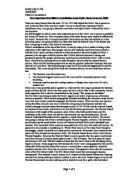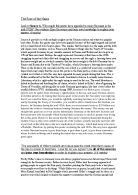1 - The Rise of the Nazis - Voted into Power?
Lenman started by introducing FOUR themes that he was going to develop during his lecture, they were:
1 THE DEPRESSION - that the crisis of the Depression eventually broke the back of the Weimar Republic and he used election results to help make this point at this stage -
1928 - NSDAP 12 seats
1930 - NSDAP 107 seats - suggesting that this leap in representation/support underlines the importance of the Depression on the rise of the Nazis.
2 THE EROSION OF THE MIDDLE GROUND OF GERMAN POLITICS -
He suggested that the polarisation of opinion in Germany was a further key issue in the Nazi rise.
3 THE EXTREMES - that the fear of Communism may have been one of the key motivating factors for many to support the Nazis.
4 SUPPORT - this he divided into two parts -
a) Which elements in German society voted Nazi
b) In November 1932 when the Nazis had reached their electoral ceiling, Hitler realised that he needed support from the establishment -
The Military
Industry.
1 Germany was proportionally worst hit by the Depression - eg unemployment - and the reasons for this were:
i There had been some success during the 1920s particularly in exporting between 1924-28 however, this was dependent on maintaining markets, but in 1929 those markets collapsed.
ii The potential of the German economy attracted investors - particularly from USA - in the 1920s BUT they were:
a) dependent on America's continued prosperity and
b) only short-term loans and thus the money could be easily removed.
So, by Summer 1932 unemployment had risen to 6 million - though this figure was more likely to have been 8/9m PLUS there were 5 million Germans working on short-time and already by the Winter of 1931/32 this included -
90% of building workers
60% of metal workers.
It should also be borne in mind that German post-war problems had been far worse than those of any of the other protagonists and they had to suffer the additional psychological factor of having lost, and then the Depression hit.
The most notable effects of being the worst hit economically may have been -
i The air of Despair that resulted eg massive increase in the number of juvenile suicides during this period
ii The increase (and acceptance) of political violence on the streets and the concern regarding the threat of Communism and
iii The social security system was overwhelmed within six months of the crisis occurring.
2 The contraction of the democratic middle-ground can be demonstrated by the percentage of the vote won by those parties. Though, they had actually struggled from the earliest days of Weimar -
January 1919 - 75%
Mid 1920 - 44%
So, the struggle for these parties began early and it was worsened by the need for a coalition in order to form a majority government.
By 1929/30, the middle ground was completely paralysed and it was the extremes that profited -
July 1932 KPD 14.3%)
NSDAP 37.3%) = 51.6%
Thus the paralysis of the whole political system brought a correspondent loss of faith amongst a people whose political culture had not been based on the principles of liberal democracy anyway, and then Hitler's propaganda machine was able to make further gain by amplifying the growing threat posed by the Communists.
3 As noted above, by July 1932 the `Extremes' won 51.6% of the vote and both were rabidly anti-democratic and anti-parliamentarian.
The KPD had been founded in December 1918, inspired by the successes of the Bolsheviks, and were violently opposed to the SPD. There were 1 million unemployed in the mid-1920s and it was this element allied to the unskilled workers who kept the party alive and then by 1930 the permanence of unemployment and depression helped to increase support. It was this increase that saw the growth of the `fear factor' amongst many in German society, especially the middle-classes who believed in the threat of a Communist seizure, encouraged by Hitler's propaganda machine, and were thus driven to the Nazis.
By 1932 the NSDAP was the biggest political movement in German history -
i It was a violently anti-Communist and hyper-nationalist movement, identifying itself the `Right' in order to gain support and respect BUT it was not conservative







